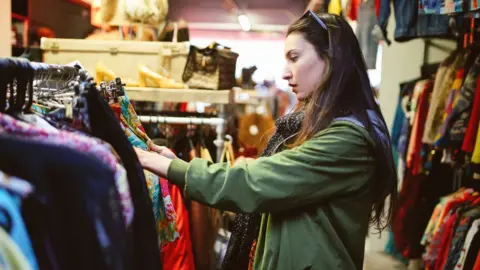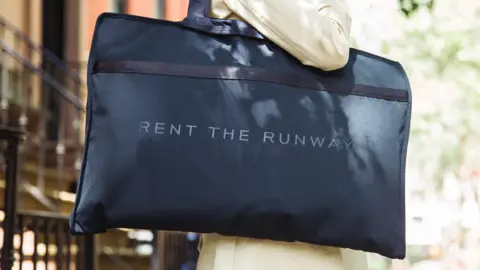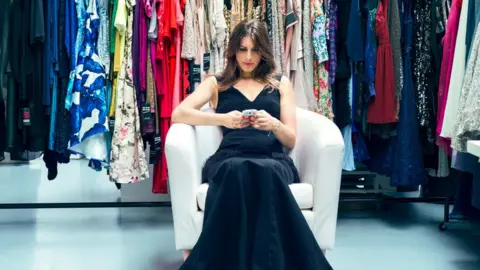Will we soon be renting rather than buying our clothes?
 Getty Images
Getty ImagesThe BBC's Circular Economy series highlights the ways we are designing systems to reduce the waste modern society generates, by reusing and repurposing products. This week we look at whether we will be renting our clothes instead of buying them in future.
Earlier this year a rather surprising marketing video went viral in China. The film, fronted by a social media influencer called Jiang Chacha takes viewers on a tour, not of a trendy night spot or fashionable clothes store but an industrial-scale laundry operation.
The company behind the ad, Beijing start-up YCloset, isn't selling laundry services, however. Instead it will rent you the latest in women's fashions.
Doris Ke, who created the campaign, says some Chinese consumers are still unsure about wearing clothes that have been worn before. The aim was to reassure them by showing the steam cleaners, the microscopes and the banks of washing machines they use to clean garments between loans.
 YCloset
YClosetAt the end of the film Jiang Chacha is offered a glass of water that has been through the washing machine - implying it would be clean enough to drink.
YCloset, like other fashion rental companies springing up around the globe, believes once it's ironed out wrinkles such as anxieties over cleanliness, the idea of fashion rental is ready to go mainstream.
And while its motives may be about building the business, if the idea does catch on, it could also disrupt the current trend towards ever more disposable fashion and help reduce the environmental impact of one of the most resource intensive industries.
 Getty Images
Getty ImagesWhile it's always been possible to rent a tuxedo, a ball-gown or a fancy-dress costume, rental firms are now chasing the market for everyday wear. They argue the time is ripe for a Netflix or a Spotify of fashion, that could see us all renting clothes as a matter of course.
So Doris Ke's next campaign for YCloset showed a young business woman, who rented her wardrobe for work and eventually became so successful she outdid her boss and made it into Forbes magazine - to persuade Chinese women take more care over what they wear to work.
In this respect, YCloset is following the same path as firms like New York-based Rent the Runway, which pioneered the rental concept back in 2009, as well as its San Francisco rival Le Tote, and in the UK, Girl Meets Dress.
 Rent the Runway
Rent the RunwayAs well as offering one-off rentals, they now offer customers subscription packages that allow them to have several garments at a time for a flat monthly fee.
Rent the Runway's CEO and co-founder Jennifer Hyman has been explicit about her ambition to "put H&M and Zara out of business".
Likewise, YCloset's chief operating officer Michael Wang has said it is "targeting the fast fashion daily wear market, where people can wear our products to work, during the weekend and also to a party".
The firm says 10 million Chinese women have registered with it, even if they don't all yet use it. Rent the Runway says nine million are "members" though that doesn't mean they all use the service.
 Getty Images
Getty ImagesIn the UK, Girl Meets Dress's founder, Anna Bance, says the same shift towards a more everyday role for rentals is happening at her firm, which started out predominantly lending designer dresses.
"Already it's not just for special occasions," says Ms Bance. Some customers may want one dress a year "for their husband's work do in the city" but others are changing their habits and hiring a couple of dresses a week.
She says increasingly customers view it as a "frictionless" service alongside shopping for new clothes, but one that gives them access to higher quality and designer items. She thinks we could eventually be spending half of our clothes budgets on renting rather than buying.
 Thierry Bouet
Thierry BouetThat is already the case for 29-year-old New York-based Mila Petrova. As a business consultant she dresses smartly every day. But as she "hates shopping" and was already fed up with her high dry cleaning bill, she has switched to renting four outfits a week from Rent the Runway.
She wears them Monday to Thursday, then returns them and picks out new outfits online for the following week.
"I use it purely for making my life easier at work," she says. But she notes that most of her friends, though they've happily embraced other parts of the sharing economy, haven't followed suit.
"Some people really like new stuff," she says, "buying and owning clothes" while others see it as an unnecessary extra expense.
It's our love of buying new stuff, that has made fashion one of the most environmentally damaging industries, says the Ellen MacArthur Foundation, which launched a campaign earlier this year to encourage fashion firms to shift towards more "circular" patterns of resource use, reducing waste, and reusing resources more.
 Mila Petrova
Mila PetrovaThe trend amongst "generation Instagram" is to wear clothes on fewer occasions before they're thrown away or dumped in the back of a wardrobe, says Francois Souchet from the Foundation. They calculate that if you are able to double the number of times you wear a garment, you decrease its environmental footprint by 44%.
As rental firms make higher profits the more times they can rent out a garment; a shift to renting also implies a shift to products that are better made and longer wearing - another step towards a more sustainable fashion industry.
Moreover, firms like Le Tote, Girl Meets Dress, Rent the Runway and YCloset are applying the same kind of principles as their fast fashion rivals when it comes to using data analysis to track which styles are popular and which are most durable.
That in turn helps to avoid waste.

Circular Economy
More on the Circular Economy.

Mr Souchet says that while he doesn't see the rental model as a solution on its own to the challenges of fast fashion, he is hopeful that it will contribute to a change in the way we consume clothes.
 Getty Images
Getty ImagesThat might rely in the long run on whether any big established players choose to back the model.
China's internet giant Alibaba, which has a track record of experimenting in the retail space, has already invested in both YCloset and Rent the Runway; while Amazon has been working hard at taking a large share of the US clothing retail market.
"It wouldn't be completely crazy" says Mr Souchet, to imagine both these online giants moving into rental fashion too, which would put a different perspective altogether on just how mainstream the idea could go.
